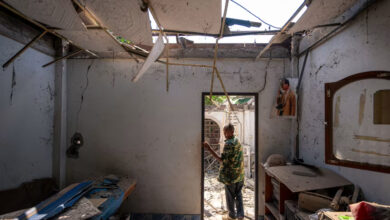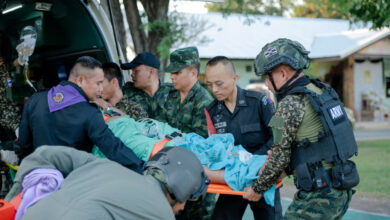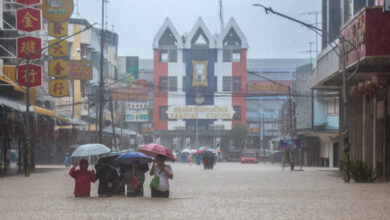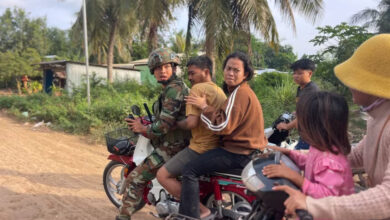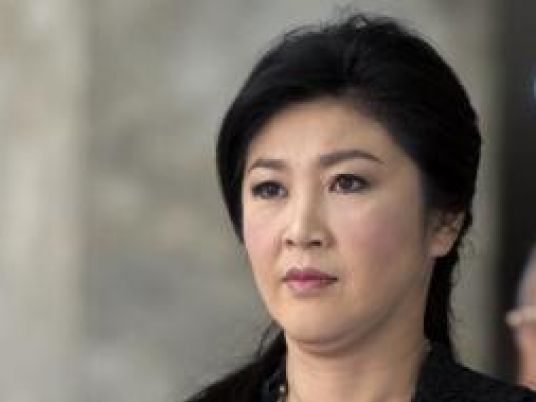
Thailand's government wants controversial elections to go ahead this weekend, a deputy prime minister said Tuesday, despite threats by opposition protesters to disrupt the polls to stop the ruling party returning to power.
Prime Minister Yingluck Shinawatra began talks with election officials who want to delay the vote following street violence in which at least 10 people have been killed and hundreds injured in grenade attacks, drive-by shootings and clashes.
In the latest incident, shots were fired Tuesday near the Bangkok army base where Yingluck was holding meetings, as hundreds of protesters massed outside.
Emergency services said two people were injured although the exact circumstances were not immediately clear.
The Thai capital has been shaken by nearly three months of mass street demonstrations, demanding Yingluck's elected government step down to make way for an unelected "people's council" that would oversee reforms aimed at curbing the dominance of her billionaire family.
The government has shown little enthusiasm for an election delay, which it fears would only prolong the political deadlock.
"We insist that the election on February 2 must be held because the majority of people want the election," Deputy Prime Minister Surapong Tovichakchaikul, who is also the foreign minister, told reporters after a cabinet meeting.
The main opposition Democrat Party is boycotting Sunday's polls, saying reforms are needed to ensure the vote is truly democratic and to prevent abuse of power by the next government.
Protesters threaten to 'close every route'
Advance voting over the weekend was marred by widespread disruption by opposition protesters who besieged polling stations and stopped hundreds of thousands from casting ballots.
Protest leader Suthep Thaugsuban has threatened to "close every route" to polling stations again for the main election, raising fears of further violence.
An anti-government rally leader was shot dead on Sunday while giving a speech from the back of a pickup truck in a Bangkok suburb, during the campaign by demonstrators to block advance voting.
In another apparently politically related killing, the body of a man wearing a wristband popular among protesters was found Tuesday near a rally site with several bullet wounds, according to police, although the circumstances of his death were unclear.
"He could be a protester or someone who infiltrated the demonstrators," said Police Colonel Charoen Srisasalak.
Yingluck's meeting with the election authorities comes after the Constitutional Court last Friday ruled that the polls could legally be pushed back because of the civil strife.
The head of Yingluck's Puea Thai Party said Monday he opposed a postponement and accused the Election Commission of not doing enough to ensure an orderly vote.
The government notes that under the constitution an election should normally be held no more than 60 days after the dissolution of parliament, which happened in early December.
The opposition argues that an election without reforms will not resolve the long-running political conflict.
The kingdom has been bitterly divided since Yingluck's older brother, the then-prime minister Thaksin Shinawatra, was overthrown by royalist generals in a coup more than seven years ago.
Critics accuse the billionaire tycoon-turned-politician of controlling his sister's government from Dubai, where he lives to avoid prison for a corruption conviction.
Several hundred protesters gathered outside the Army Club in the capital where Yingluck's cabinet met and where the premier was due to meet election officials later in the day.
"We came today to ask the prime minister to resign and take responsibility that our people were shot dead," protest leader Chumphon Julsai said over a loudspeaker outside the venue, which was guarded by riot police.
The protesters have staged a self-styled "shutdown" of Bangkok since January 13, occupying several main intersections, although attendance has gradually dwindled and disruption has been limited.
The government has declared a 60-day state of emergency in the capital and surrounding areas, giving authorities the power to ban public gatherings of more than five people, although they have not yet done so and demonstrators have vowed to defy the decree.

